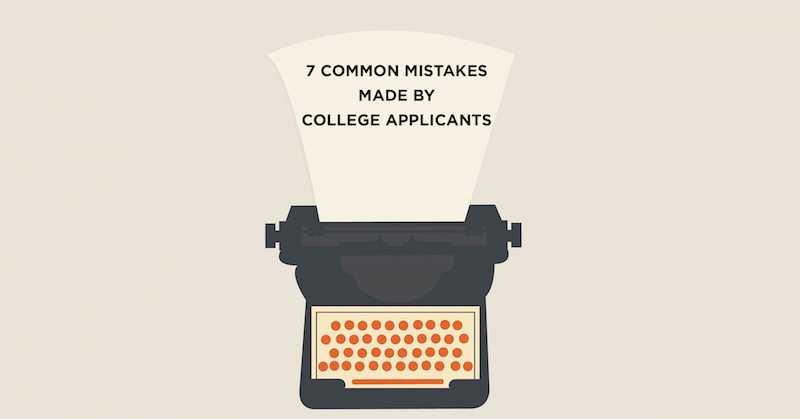Eager to complete their college applications, students often don’t take the time to carefully think about what they are submitting or consider the consequences of some common mistakes. We asked our friends at Solomon Admissions what are some situations you want to avoid:

1. Not demonstrating enough interest. There are many ways to demonstrate interest in a college, and many of them will consider this as they review your application. One of the strongest ways is to visit the campus. If that’s not possible, other ways include: requesting an alumni interview locally, “Like” their Facebook page, or subscribing to any blogs or newsletters they might offer to prospective students. Equally important, do not use a generic response to any questions about why you are interested in a particular school. You should have very specific reasons to demonstrate your knowledge of the school.
2. Not following instructions. Too many students don’t follow instructions – extra recommendation letters, too long essays, attachments that duplicate information already on the application – these are all common mistakes. Admissions staff must wade through thousands, if not tens of thousands, of applications; creating more work for them isn’t appreciated and extraneous information is often ignored in the interest of time.
3. Not answering the questions asked. Far too often students have decided what they want to say on their college essay, regardless of what the question is actually asking. There’s a reason a college is asking a particular question - whether it’s on their own application or the Common App. The essay helps colleges determine whether a student is not just capable of understanding the question, but also if there’s a good “fit” between the student and school. Some questions can seem deceptively easy or simple to answer, but they are actually seeking a great deal of critical thinking in your response. If you are unsure what the essay is really trying to get at, ask a teacher or counselor to help explain it. Similarly, when answering “Why X”, answer with what you hope to contribute to a college environment and how it’s a great fit for what you’re looking for, don’t just repeat what they’ve told you about themselves.
4. Being too “cute”, or a sesquipadalian or self-important. Writing an essay using “texting” language or “emojis” is not appropriate. Neither is an essay written in haiku. It’s the rare student who can get away with being “cute” on an essay and still say something meaningful. Don’t risk it! Using long, fancy words when shorter, common words will suffice is also preferable – it doesn’t impress anyone and studies have shown that they can make you appear less intelligent. Finally, although you should use the application to present yourself in the best light, appearing too self-important, highlighting privilege, or denigrating others will hurt your application.
5. Poor proofreading/Relying on computer. It’s important that your application be polished and well-presented. Although you can use your auto spelling or grammar checks as a start, do not rely on them exclusively. They are not perfect, and will not catch properly spelled words that are not the ones you meant to use.
6. Waiting until the last minute. Asking your counselors and teachers for letters of recommendations or to send out transcripts, test scores, etc. at the last minute is disrespectful of their time and will likely cause a delay in submitting your application. You are not the only person who will be asking for their help; ask very early; the end of your junior year is not too soon.
7. Not following up on completion. Submitting your application does not mean it is complete. Letters of recommendation, test scores, and transcripts are sent from other sources. It is your responsibility to ensure that all parts of your application are sent by the required deadline. Your application will not be considered if it is incomplete.
















 Back
Back